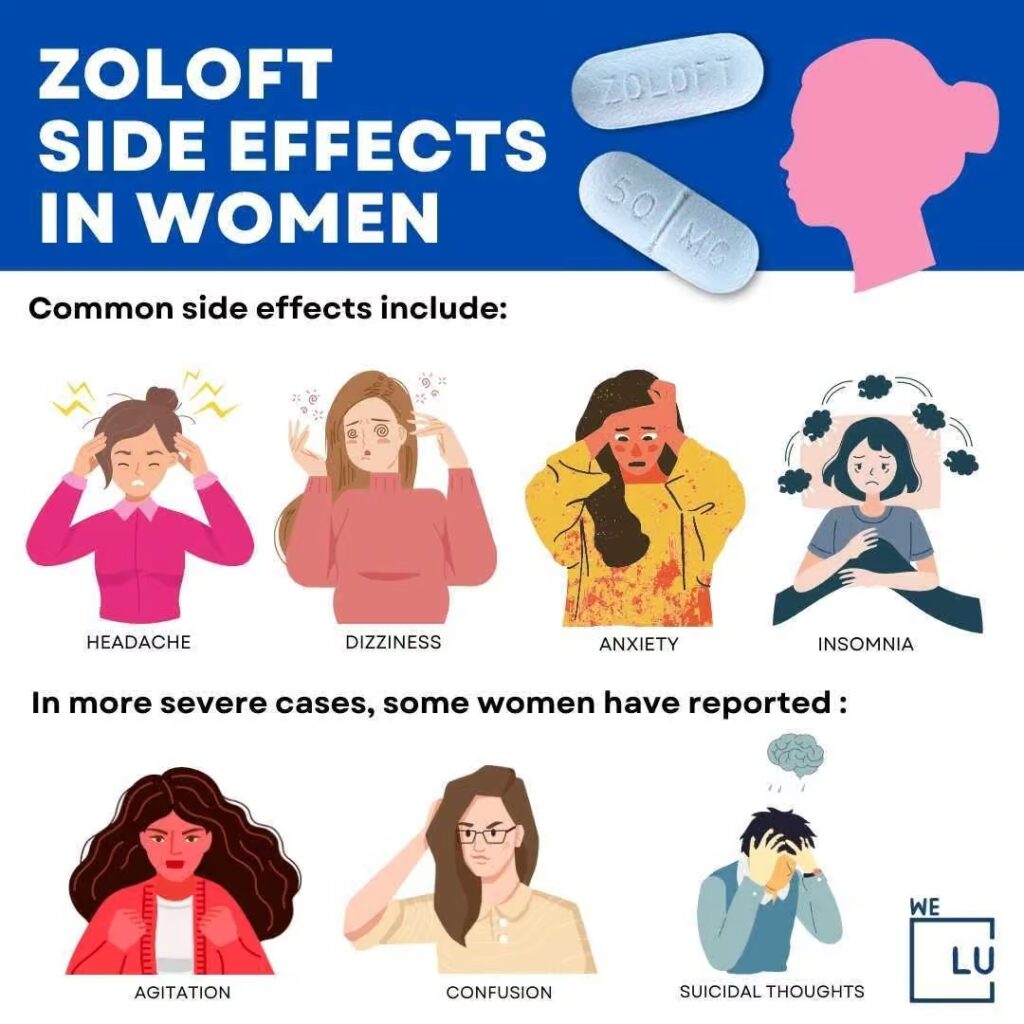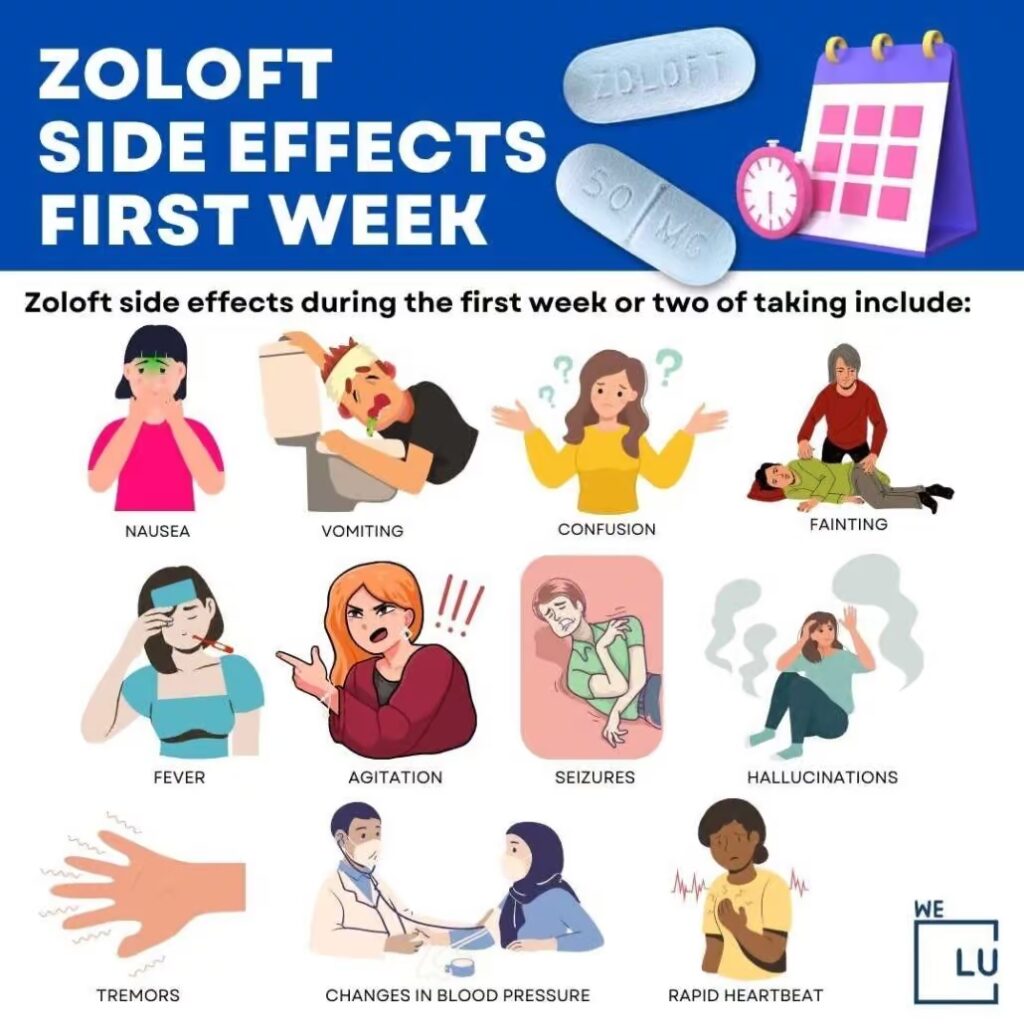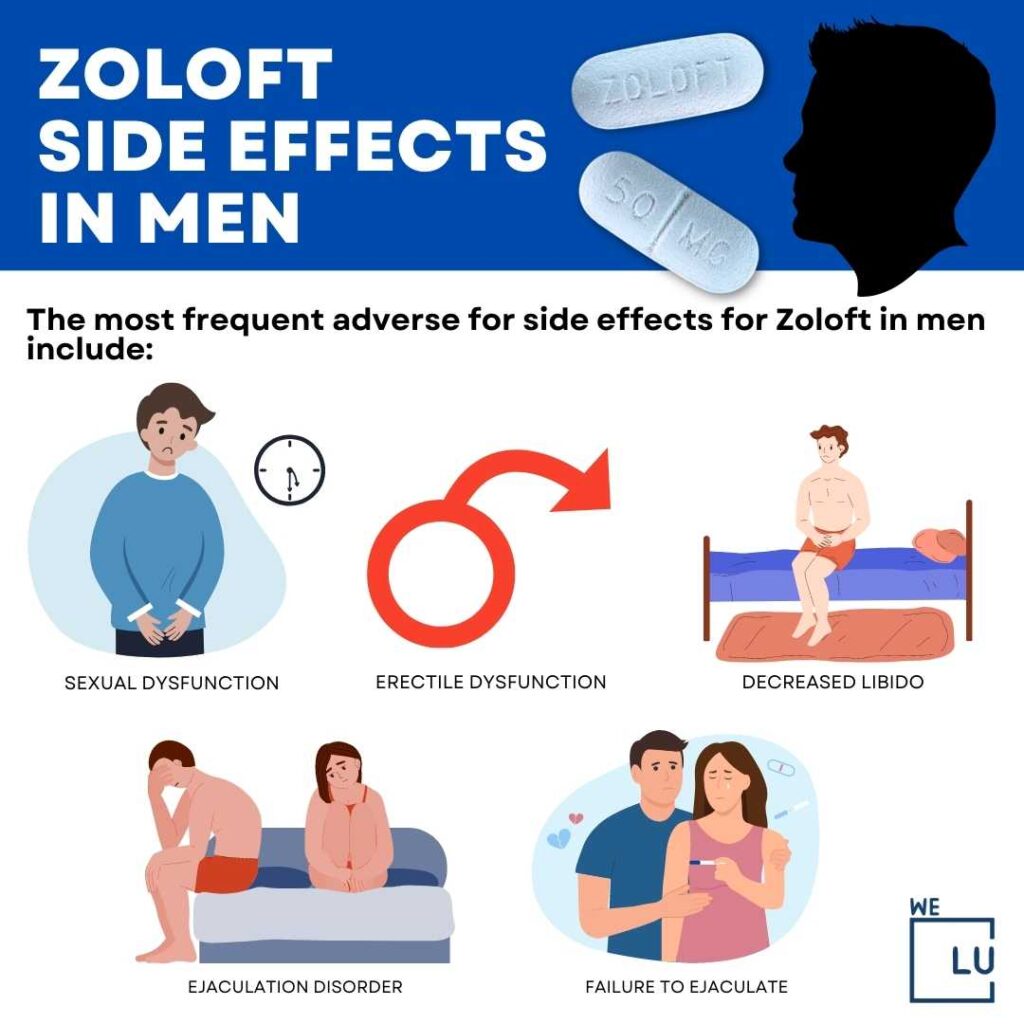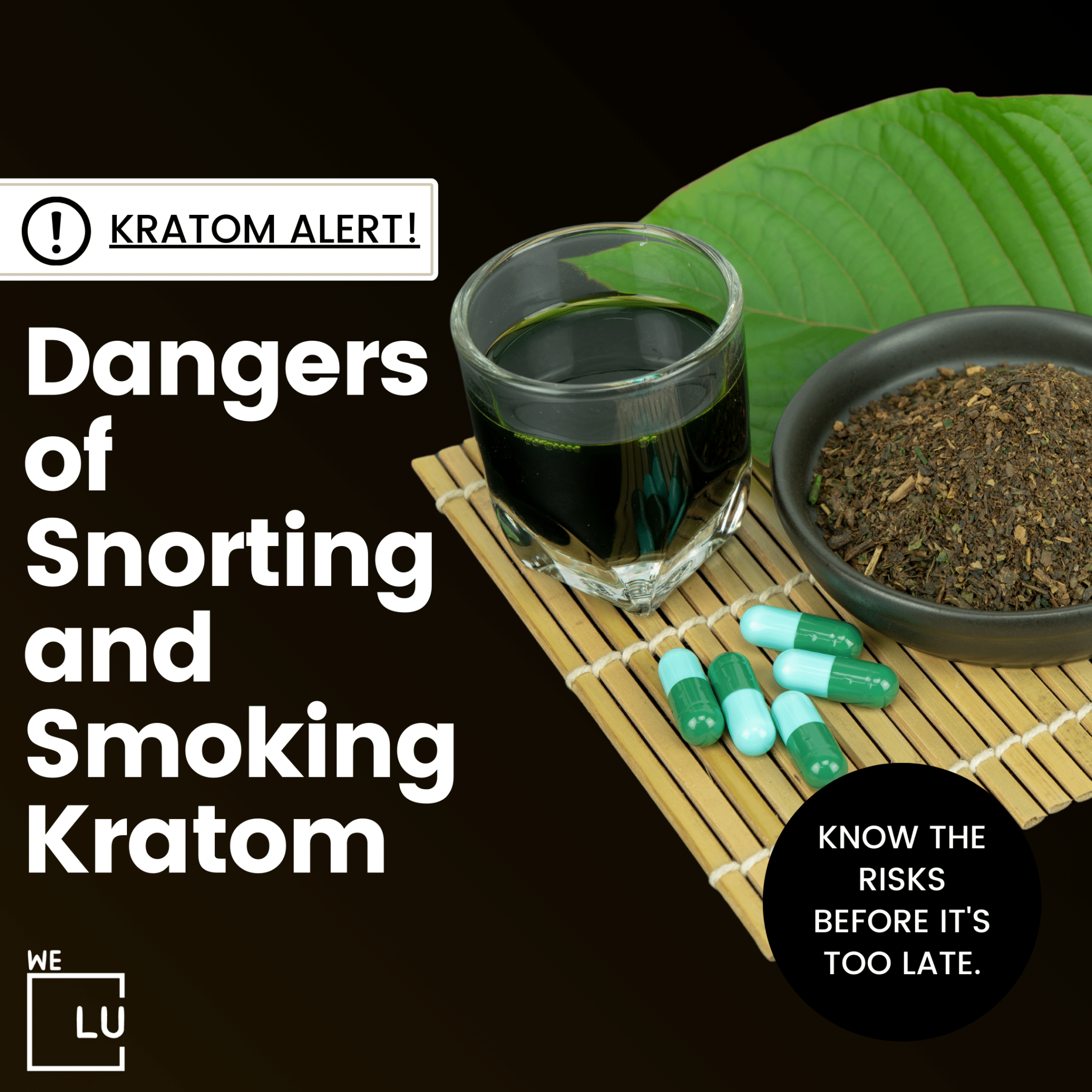What Is Zoloft?
Zoloft is a brand name for the generic drug sertraline. It belongs to a class of medications known as selective serotonin reuptake inhibitors (SSRIs). Zoloft is primarily prescribed as an antidepressant to treat various mental health conditions.
Zoloft has many reported side effects. These side effects range from mild to severe and can vary between men and women. Read on to learn more about the side effects of Zoloft in women.
Zoloft Side Effects In Women
Zoloft, like any medication, can cause side effects, and these effects can vary from person to person. It’s important to note that the following list includes potential side effects, and not everyone will experience them. Additionally, the severity and duration of side effects can vary. If you are considering taking Zoloft or are currently using it and experiencing any concerning symptoms, consult your healthcare provider. Here are some potential side effects of Zoloft in women:
Common Side Effects:
- Nausea.
- Upset stomach.
- Diarrhea.
- Dry mouth.
- Sleep disturbances (insomnia or drowsiness).
Less Common Side Effects:
- Headache.
- Dizziness.
- Sweating.
- Nervousness or jitteriness.
- Weight changes (loss or gain).
Serious Side Effects (Rare):
- Serotonin syndrome: symptoms may include confusion, hallucinations, seizures, extreme changes in blood pressure, increased heart rate, fever, excessive sweating, shivering or shaking, blurred vision, muscle spasm or stiffness, tremors, incoordination, stomach cramps, nausea, vomiting, and diarrhea.
- Allergic reactions: rash, itching, swelling, severe dizziness, or difficulty breathing.
Sexual Side Effects of Zoloft in Women:
Some women may experience sexual side effects while taking Zoloft, including changes in libido (sex drive), difficulty achieving orgasm, or delayed ejaculation.
Zoloft For Pregnant Women
One should discuss the potential risks and benefits of using Zoloft with a healthcare provider during pregnancy. In some cases, the benefits of treating depression or other mental health conditions with Zoloft may outweigh the potential risks.
Any concerns or side effects experienced while taking Zoloft should be communicated to a healthcare provider for further evaluation and guidance. Adjustments to medication dosage or alternative treatment options may be considered based on individual responses and needs.
What is Zoloft Used For?
- Major Depressive Disorder (MDD): Zoloft is used to alleviate symptoms of depression, such as persistent feelings of sadness, hopelessness, and a lack of interest or pleasure in daily activities.
- Obsessive-Compulsive Disorder (OCD): Zoloft is effective in treating obsessive-compulsive disorder, a condition characterized by intrusive thoughts (obsessions) and repetitive behaviors or mental acts (compulsions).
- Panic Disorder: It is used to manage panic attacks and symptoms associated with panic disorder, including sudden and intense feelings of fear or discomfort.
- Social Anxiety Disorder: Zoloft can be prescribed for social anxiety disorder, a condition marked by overwhelming anxiety and self-consciousness in social situations.
- Post-Traumatic Stress Disorder (PTSD): Zoloft is sometimes used to help manage symptoms of PTSD, including flashbacks, nightmares, and persistent anxiety following a traumatic event.
- Premenstrual Dysphoric Disorder (PMDD): Zoloft is approved for the treatment of PMDD, a severe form of premenstrual syndrome (PMS) characterized by mood swings, irritability, and other emotional and physical symptoms.
Zoloft works by increasing serotonin levels, a neurotransmitter in the brain, which is thought to play a crucial role in regulating mood and emotional well-being.
Make sure to take Zoloft as prescribed by a healthcare professional, and any adjustments to the dosage should be made under their guidance. Like all medications, Zoloft may have potential side effects. Individuals should discuss any concerns or experiences with their healthcare provider. Discontinuing or changing the dosage of Zoloft should be done under medical supervision to avoid withdrawal symptoms or potential adverse effects.

Skip To:
Learn More:
- Zoloft Side Effects, Common and Serious Side Effects, Interactions & Alcohol
- Zoloft Withdrawal, Dependence, Side Effects & Overdose
- Zoloft And Alcohol Side Effects, Effects on Depression, Risks & Treatment
- High-functioning depression, Symptoms, How does it feels, Major Depression Episodes & Treatment
- Depression And Anxiety Quotes, 101 Positive Quotes to Help You With The Struggle

Get Your Life Back
Find Hope & Recovery. Get Safe Comfortable Detox, Addiction Rehab & Dual Diagnosis High-Quality Care.
Hotline (855) 695-1160
Mild Zoloft Side Effects
While many people tolerate Zoloft (sertraline) well, some individuals may experience mild side effects when taking the medication. It’s important to note that the occurrence and intensity of side effects can vary from person to person. Here are some mild side effects associated with Zoloft:
- Nausea: Some individuals may experience mild nausea, especially when starting the medication. Taking Zoloft with food can sometimes help alleviate this symptom.
- Upset Stomach: Upset stomach, including symptoms like indigestion or mild discomfort, can occur in some individuals.
- Diarrhea or Loose Stools: Zoloft may cause changes in bowel habits, leading to diarrhea or loose stools in some people.
- Dry Mouth: A feeling of dryness in the mouth is a common and generally mild side effect.
- Insomnia or Sleep Disturbances: Zoloft can affect sleep patterns, leading to difficulty falling or staying asleep in some individuals.
- Dizziness: Some people may experience mild dizziness or lightheadedness, especially when standing up quickly.
- Fatigue: Zoloft can cause fatigue or drowsiness in some individuals.
- Headache: Headaches are a possible side effect, although they are usually mild and transient.
Let your healthcare provider know if you are experiencing any symptoms, even mild ones. They can guide the management of these symptoms and may adjust the dosage if necessary. In many cases, mild side effects diminish as the body adjusts to the medication. However, it’s crucial not to make any changes to your medication without consulting your healthcare provider. If you experience severe or persistent side effects, immediately consult your healthcare provider.
Serious Zoloft Side Effects
These severe side effects are rare, but they require immediate medical attention if they occur. If you experience any of the following serious side effects while taking Zoloft, seek medical help immediately:
- Serotonin Syndrome: This is a potentially life-threatening condition that can occur when there is an excess of serotonin in the body. Symptoms may include confusion, hallucinations, seizures, extreme changes in blood pressure, increased heart rate, fever, excessive sweating, shivering or shaking, blurred vision, muscle spasm or stiffness, tremors, incoordination, stomach cramps, nausea, vomiting, and diarrhea.
- Allergic Reaction: In rare cases, individuals may experience an allergic reaction to Zoloft, including symptoms such as rash, itching, swelling, severe dizziness, or difficulty breathing.
- Suicidal Thoughts: In some individuals, especially those under the age of 25, antidepressant medications like Zoloft may increase the risk of suicidal thoughts or behaviors. It’s crucial to monitor for changes in mood and report any unusual thoughts or behaviors to a healthcare provider.
- Abnormal Bleeding: SSRIs, including Zoloft, may increase the risk of bleeding or bruising. Report any unusual bleeding or bruising promptly.
- Severe Liver Problems: While rare, Zoloft may cause severe liver problems. Symptoms may include persistent nausea, vomiting, yellowing of the eyes or skin (jaundice), dark urine, and unusual fatigue.
- Hyponatremia (Low Sodium Levels): In some cases, Zoloft may cause low sodium levels, leading to headaches, difficulty concentrating, memory changes, confusion, weakness, and instability.
- Withdrawal Symptoms: Abruptly stopping Zoloft can lead to withdrawal symptoms, including dizziness, nausea, headache, irritability, insomnia, and other flu-like symptoms. It’s important to taper off the medication under the guidance of a healthcare provider.
Communicating any concerns or symptoms to your healthcare provider immediately is crucial. If you experience severe or persistent side effects, especially those that may indicate a serious medical condition, seek emergency medical attention or contact your healthcare provider immediately.
Get Help. Get Better. Get Your Life Back.
Searching for an Accredited Drug and Alcohol Rehab Centers in Near You?
Even if you have failed previously and relapsed, or are in the middle of a difficult crisis, we stand ready to support you. Our trusted behavioral health specialists will not give up on you. When you feel ready or just want someone to speak to about therapy alternatives to change your life call us. Even if we cannot assist you, we will lead you to wherever you can get support. There is no obligation. Call our hotline today.
FREE Addiction Hotline – Call 24/7How To Use Zoloft
To use Zoloft (sertraline) effectively, follow your healthcare provider’s instructions carefully. Here is a general guide on how to use Zoloft without bullet points:
- Dosage: Take Zoloft exactly as prescribed by your healthcare provider. Do not alter the dosage without consulting them.
- Timing: Take Zoloft once daily, either in the morning or evening, with or without food. Consistency in the timing of your doses is important.
- Swallow Whole: Swallow the tablet whole with a glass of water. Do not crush, chew, or break the tablet.
- Follow Instructions: Follow any specific instructions given by your healthcare provider, especially if there are changes in dosage or instructions for tapering on or off the medication.
- Regular Check-ins: Attend scheduled follow-up appointments with your healthcare provider to monitor your progress and discuss any concerns or side effects.
- Be Patient: It may take several weeks before you notice the full benefits of Zoloft. Continue taking it regularly, even if you start feeling better.
- Missed Dose: If you miss a dose, take it as soon as you remember. If it’s close to the time for your next dose, skip the missed dose and resume your regular schedule. Do not double up on doses.
- Avoid Alcohol: Limit or avoid alcohol while taking Zoloft, as it can interact with the medication and increase the risk of side effects.
- Inform Healthcare Provider: Inform your healthcare provider about all other medications, supplements, or herbal products you are taking to avoid potential interactions.
- Report Side Effects: Promptly report any side effects or unusual symptoms to your healthcare provider.
- Do Not Stop Abruptly: Avoid stopping taking Zoloft abruptly without consulting your healthcare provider. Stopping suddenly can lead to withdrawal symptoms.
- Emergency Help: Seek emergency medical help if you experience severe allergic reactions, such as difficulty breathing, swelling, or painful skin reactions.
Always consult your healthcare provider for personalized guidance based on your medical condition and needs.
Comfortable Facilities & Amenities
High-Quality Addiction & Mental Health Rehabilitation Treatment
Rehab Centers TourRenowned California Addiction Center. Serene Private Facilities. Inpatient rehab programs vary.
Addiction Helpline (855) 695-1160Proven recovery success experience, backed by a Team w/ History of:
15+
Years of Unified Experience
100s
5-Star Reviews Across Our Centers
10K
Recovery Success Stories Across Our Network
- Low Patient to Therapist Ratio
- Onsite Medical Detox Center
- Comprehensive Dual-Diagnosis Treatment
- Complimentary Family & Alumni Programs
- Coaching, Recovery & Personal Development Events
How Do Side Effects Of Zoloft In Women Compare With Those in Men?


In general, the side effects of Zoloft (sertraline) are similar for both men and women. However, individual responses to medications can vary, and there might be differences in the prevalence or intensity of specific side effects between genders. For example, sexual side effects may manifest differently in men and women.
Men are more likely to experience erectile dysfunction (difficulty achieving or maintaining an erection), delayed ejaculation (requiring more than 30 minutes of sexual stimulation to ejaculate), or an inability to ejaculate. Women may have difficulty reaching orgasm. Both men and women taking Zoloft may experience a reduced sex drive compared to their usual.
Communicate openly with healthcare providers about any side effects experienced and any concerns or changes in symptoms. Healthcare providers can guide managing side effects, adjusting the dosage if necessary, or considering alternative treatments.
Individual responses to medication are highly variable, and the key is to monitor and address each person’s unique experience with the medication, regardless of gender.
Learn more about Zoloft Side Effects In Men:
World-class, Accredited, 5-Star Reviewed, Effective Addiction & Mental Health Programs. Complete Behavioral Health Inpatient Rehab, Detox plus Co-occuring Disorders Therapy.
CALL (855) 695-1160End the Addiction Pain. End the Emotional Rollercoaster. Get Your Life Back. Start Drug, Alcohol & Dual Diagnosis Mental Health Treatment Now. Get Free No-obligation Guidance by Substance Abuse Specialists Who Understand Addiction & Mental Health Recovery & Know How to Help.
Estrogen Levels Of Women On Antidepressants
Antidepressants, including selective serotonin reuptake inhibitors (SSRIs) like Zoloft (sertraline), can sometimes influence hormone levels, including estrogen. However, the specific impact on estrogen levels can vary among individuals and may depend on factors such as the type of antidepressant, the dosage, and individual differences in response.
Factors to consider regarding antidepressants and estrogen levels:
- Indirect Effects: Antidepressants primarily target neurotransmitters in the brain, and any impact on hormone levels, including estrogen, is often indirect. The medications aim to restore balance in neurotransmitter function, which can influence mood.
- Variability: Responses to antidepressants are highly individualized, and not everyone will experience the same changes in hormone levels. Additionally, the impact on estrogen levels may be more noticeable in certain individuals or with specific medications.
- Menstrual Cycle Irregularities: Some women may experience changes in their menstrual cycles, including irregularities while taking antidepressants. These changes are likely related to the medication’s effects on neurotransmitters rather than a direct influence on estrogen levels.
- Hormonal Interactions: Antidepressants may interact with the endocrine system, which includes hormone regulation. However, the specific mechanisms of these interactions can be complex and may vary between different classes of antidepressants.
- Individual Variability: Hormone levels, including estrogen, can be influenced by various factors, such as age, overall health, and genetic factors. Antidepressants may have different effects on hormone levels in other individuals.
If you have concerns about the potential impact of antidepressants on your hormone levels, including estrogen, discuss these concerns with your healthcare provider. They can provide personalized information based on your medical history, symptoms, and the antidepressant you are taking. In some cases, additional monitoring or adjustments to treatment may be considered. Prioritize open communication with your healthcare provider to ensure that your mental health needs are addressed while minimizing potential side effects or concerns related to hormone levels.
Warnings For Zoloft
Zoloft (sertraline) comes with several warnings that individuals should be aware of. One should take these warnings seriously and discuss any concerns with a healthcare provider. Here are some critical warnings associated with Zoloft:
- Suicidal Thoughts and Behaviors: Antidepressants, including Zoloft, may increase the risk of suicidal thoughts, especially in children, adolescents, and young adults. Close monitoring is crucial, especially when starting the medication or adjusting the dosage.
- Serotonin Syndrome: The use of Zoloft can lead to serotonin syndrome, a potentially life-threatening condition characterized by symptoms such as confusion, hallucinations, seizures, extreme changes in blood pressure, increased heart rate, fever, excessive sweating, shivering or shaking, blurred vision, muscle spasm or stiffness, tremor, incoordination, stomach cramp, nausea, vomiting, and diarrhea.
- Allergic Reactions: Individuals may experience allergic reactions to Zoloft, resulting in rash, itching, swelling, severe dizziness, or difficulty breathing. Seek immediate medical attention if allergic reactions occur.
- Withdrawal Symptoms: Abruptly stopping Zoloft can lead to withdrawal symptoms, including dizziness, nausea, headache, irritability, insomnia, and other flu-like symptoms. Tapering off the medication under the guidance of a healthcare provider is recommended.
- Increased Bleeding Risk: SSRIs, including Zoloft, may increase the risk of bleeding or bruising, especially when used with other medications that affect clotting.
- Activation of Mania/Hypomania: Zoloft may induce a manic or hypomanic episode in individuals with bipolar disorder. Close monitoring is essential, and adjustments to treatment may be necessary.
- Hyponatremia (Low Sodium Levels): In some cases, Zoloft may cause low sodium levels, leading to headaches, difficulty concentrating, memory changes, confusion, weakness, and instability.
- Bone Fracture Risk: Some studies suggest a potential association between SSRIs and an increased risk of bone fractures, especially in older adults.
Individuals taking Zoloft should communicate openly with their healthcare provider about their medical history, pre-existing conditions, and any medications or supplements they take. This helps ensure the safest and most effective use of the medication.
Experience Transformative Recovery at the We Level Up California Treatment Center.
See our authentic success stories. Get inspired. Get the help you deserve.



Start a New Life
Begin with a free call to an addiction & behavioral health treatment advisor. Learn more about our dual-diagnosis programs. The We Level Up treatment center network delivers recovery programs that vary by each treatment facility. Call to learn more.
- Personalized Care
- Caring Accountable Staff
- World-class Amenities
- Licensed & Accredited
- Renowned w/ 100s 5-Star Reviews
We’ll Call You
Therapist Tips to Cope & Combat Depressive Episodes. Depression Symptoms & Signs Recovery Strategies
Search Zoloft Side Effects In Women, Drug & Alcohol Rehab / Detox & Mental Health Topics & Resources
Sources
- Zoloft (sertraline hydrochloride) tablets, for oral use; Zoloft (sertraline hydrochloride) oral solution. (2023). Related: Zoloft side effects in women, Zoloft Side Effects Women, Side Effects of Zoloft in Women. https://www.accessdata.fda.gov/drugsatfda_docs/label/2023/019839s102,020990s059lbl.pdf
- MedlinePlus. Sertraline(Zoloft). https://medlineplus.gov/druginfo/meds/a697048.html Related: Zoloft side effects in women, Zoloft Side Effects Women, Side Effects of Zoloft in Women.
- Singh HK, Saadabadi A. Sertraline. [Updated 2023 Feb 13]. In: StatPearls [Internet]. Treasure Island (FL): StatPearls Publishing; 2023 Jan-. Available from: https://www.ncbi.nlm.nih.gov/books/NBK547689/ Related: Zoloft side effects in women, Zoloft Side Effects Women, Side Effects of Zoloft in Women.
- Food and Drug Association. FDA. Sertraline (marketed as Zoloft) Information. https://www.fda.gov/drugs/postmarket-drug-safety-information-patients-and-providers/sertraline-marketed-zoloft-information Related: Zoloft side effects in women, Zoloft Side Effects Women, Side Effects of Zoloft in Women.
- Chu A, Wadhwa R. Selective Serotonin Reuptake Inhibitors. [Updated 2023 May 1]. In: StatPearls [Internet]. Treasure Island (FL): StatPearls Publishing; 2023 Jan-. Available from: https://www.ncbi.nlm.nih.gov/books/NBK554406/
- Mother To Baby | Fact Sheets [Internet]. Brentwood (TN): Organization of Teratology Information Specialists (OTIS); 1994-. Sertraline (Zoloft®) 2021 Aug 1. Available from: https://www.ncbi.nlm.nih.gov/books/NBK582954/ Related article: Zoloft For Pregnant Women
- Kelly K, Posternak M, Alpert JE. Toward achieving optimal response: understanding and managing antidepressant side effects. Dialogues Clin Neurosci. 2008;10(4):409-18. doi: 10.31887/DCNS.2008.10.4/kkelly. PMID: 19170398; PMCID: PMC3181894. Related: Zoloft side effects in women, Zoloft Side Effects Women,
- Heinonen E, Blennow M, Blomdahl-Wetterholm M, Hovstadius M, Nasiell J, Pohanka A, Gustafsson LL, Wide K. Sertraline concentrations in pregnant women are steady and the drug transfer to their infants is low. Eur J Clin Pharmacol. 2021 Sep;77(9):1323-1331. doi: 10.1007/s00228-021-03122-z. Epub 2021 Mar 22. PMID: 33751155; PMCID: PMC8346399.
- InformedHealth.org [Internet]. Cologne, Germany: Institute for Quality and Efficiency in Health Care (IQWiG); 2006-. Depression: How effective are antidepressants? [Updated 2020 Jun 18]. Available from: https://www.ncbi.nlm.nih.gov/books/NBK361016/ Related: Zoloft side effects in women, Zoloft Side Effects Women, Woman Zoloft Side Effects.




